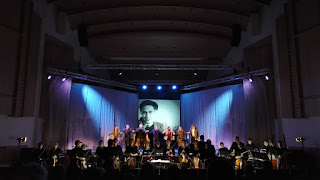ATLANTIKSEN
KEISARI
Saaristo-ooppera
esitti viime syksynä Turussa Victor Ullmannin oopperan Atlantiksen keisari.
Valitettavasti en tuolloin päässyt katsomaan sitä, mutta onneksi he vierailivat
nyt Oulun musiikkijuhlilla tämän oopperan kanssa. Oululaiset eivät ilmeisesti
olleet syttyneet oopperalle, sillä näytöksessä oli vain kourallinen katsojia,
mikä oli kyllä harmi. Toivottavasti toiseen näytökseen 24.3. tulee enemmän
väkeä.
Oopperan historia
on varsin erikoinen. Victor Ullmann ja libretisti Peter Kien tekivät oopperan
Theresienstadtin keskitysleirillä, jossa oopperaa ei loppujen lopuksi
kuitenkaan esitetty, koska siinä nähtiin Hitleriin kohdistuvaa satiiria, vaan
kantaesitys oli vasta vuonna 1975 Amsterdamissa. Molemmat tekijät kuolivat
Auschwitzissä, joten he eivät koskaan nähneet teostaan esitettävän. Lyhykäisyydessään
oopperan juoni kertoo keisarista, joka laittaa koko maailman sotimaan ja haluaa
määrätä, kuka milloinkin kuolee. Itse Kuolema kuitenkin suuttuu tästä ja
kieltää kuoleman kaikilta. Lopulta keisari nöyrtyy kuolemaan ensimmäisenä,
jotta muutkin ihmiset voivat kuolla.
Musiikillisesti
teos oli aika persoonallinen. Mukana oli hyvin erilaisia musiikkityylejä alkaen
schlagerin oloisista pätkistä. Oulu Sinfonia Jaakko Kuusiston johdolla esiintyi
todella hienosti ja sai musiikkiin mielenkiintoista väriä ja vauhtia.
Laulajilla oli haasteellinen tehtävä kuulua orkesterin alta; en ole varma miten
hyvin Madetojansali sopii tällaisiin esityksiin akustisesti. Laulajista suosikikseni
nousi Jussi Merikanto Kuoleman roolissa. Hänen äänensä soi oikein kauniisti ja
hänen olemuksensa sopi muutenkin kyseiseen rooliin.
Puvustus ja
lavastus olivat varsin yksinkertaisia ja ajattomia. Videoprojisoinneilla
tuotiin mukaan historian tuntua ja valaistusta käytettiin oivaltavasti
tunnetiloja kuvastamaan.
 |
| Madetojan sali |
 |
| Näyttämö |
 |
| Esiintyjät |






















